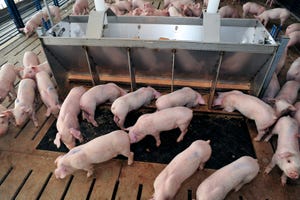You can’t lead without love
What we do in agriculture is stunningly purposeful; how does daily work connect with the individual team member’s sense of purpose?
February 14, 2024
.jpg?width=850&auto=webp&quality=95&format=jpg&disable=upscale)
By Jon Hoek, Performance Management Inc./WPS Nutrition
I recently viewed a YouTube clip from a so-called business guru from Scotland who promoted sacrificing everything for success. He even advocated figuratively killing your past (family and friends) in the interest of accumulating wealth. To replicate this individual’s financial success, his followers pay tens of thousands of dollars to learn his methods, and these methods have nothing to do with caring for people. However, there is a more excellent way.
“You can’t lead without love” is a piece of advice that a dear friend gave me, and this philosophy works for any business that relies on people. This advice sounds emotional, and it doesn’t use the normal language of business, but it is no less valid. On his podcast "Love in Action," Marcel Schwantes said, “I have found that the best organizations on the planet care about and value the whole person — their emotional, mental, physical, financial and even spiritual well-being — to achieve outstanding business outcomes.”
So how do you love your people? The definition for love is a strong affection or personal attachment to something. Love can also be a verb: to hold dear or cherish. Patrick Lencioni has an excellent book titled "The Three Signs of a Miserable Job" in which he gives us a framework to effectively demonstrate love in leadership. The three signs he presents for recognizing a miserable job are anonymity, irrelevance and immeasurement. We will be discussing both these signs and steps to prevent them.
Anonymity
Know your people – How well do you know your people? I once interacted with a truck driver who had been employed on the same farm for 10 years. I shadowed him on a delivery of pigs, and through the course of our discussion I learned that his daughter had struggled with a drug addiction. She had been through rehab and was in recovery at the time, but it was a very difficult experience for the entire family. When I mentioned this to the owner, he had no idea that the truck driver even had a daughter, in spite of the driver’s tenure with the farm. Regular interaction and a true sense of concern for the entire family is key in combatting an employee’s feelings of anonymity.
Utilize industrial psychology through assessments – In 1998, Fred Schmidt (University of Iowa) and John Hunter (Michigan State University) published a paper titled "The Validity and Utility of Selection Methods in Personnel Psychology: Practical and Theoretical Implications of 85 Years of Research Findings." They sought to verify the use of General Mental Ability testing for the recruitment and hiring of employees. In this work, Schmidt and Hunter found that GMA testing increases the ability of the firm to make better choices in retaining these employees. Many assessments today are underutilized due to the “one and done” use of the assessments. New technologies, such as Cloverleaf, provide a platform for continual use of assessments in the daily operations management of the business. I have seen Cloverleaf used in feed mills and breed-to-wean farms to understand employees in new and meaningful ways.
Irrelevance
Vocation matters. James Hakner, in a compelling article from the University of Sussex, states, "The modern workplace is as much a battle for hearts and minds as it is one of rules and duties." This concept applies to workplaces of all kinds.
What we do in agriculture is stunningly purposeful. How does the daily work connect with the individual team member’s sense of purpose? This is intertwined with immeasurement and anonymity.
Does the purpose of the business connect with the individual’s life goals for their own family?
Immeasurement
Systems – How do people know they are meeting the mark? Continuous improvement thinking can work in tandem with production dashboards to help define success.
Coaching – Aligning the personal objectives of team members with the objectives of the business is an essential skill for managers. The tyranny of the urgent compromises our ability to measure or benchmark performance against our expectations.
Discipline – Sometimes the greatest expression of love is to fire an employee. Of course, this only comes after the use of progressive discipline. Many times, we need to release the employee to utilize their gifts elsewhere. We tend to think that firing someone is uncaring and ruthless. Nothing could be farther from the truth. Often this expresses love for the individual being let go as well as love for the existing employees who may have experienced the pain of a coworker placed in a position that didn’t fit their gifts. Progressive discipline is a multi-step process starting with a 1:1 conversation and progressing to additional visits with multiple supervisors. If there is no progress, then termination is the last step.
Using the word love in a business conversation can be uncomfortable, but it is necessary. One thing is sure: no matter what our vocation, people are involved. Understanding how to engage with the people around us is critical to building a effective relationships, whether business or personal. Good relationships outlast business – that is the most excellent way.
You May Also Like



